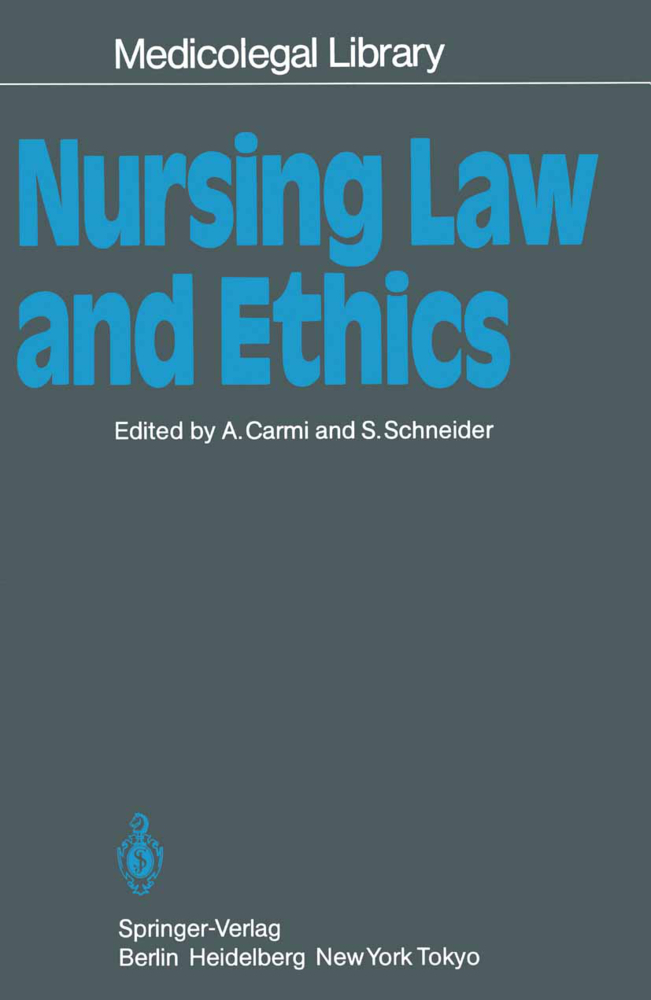Nursing Law and Ethics
Nursing Law and Ethics
The papers in this section on the legal aspects of nursing can be divided into two parts: (a) the rights and responsibilities of nurses, patients, and the medical system and (b) treatment, with its legal ramifications. How does one decide whether patients' rights or the health professional's rights are to be considered more seriously? Is there an absolute "right" or "wrong"? Since legal rights are sanctioned by constantly changing social and political climates, this may, in effect, diminish the possibility of anything absolute. The question of the "equivalency" of legal and moral rights is also addressed. Due to the prevalent vagueness with regard to bioethical issues as they affect hu man and legal rights, often we become absorbed in philosophical polemics without being able to arrive at anyone answer. In order to move beyond the ethical/theoret ical fonnulations, there is daily confrontation in the nursing profession -the practi cal application of theoretics.
II. Nursing: Legal Aspects
Rights and Responsibilities
Human Rights in the Nurse-Patient Relationship
Whats Wrong About Rights
Medical Care: The Problem of Autonomy
Rights and Responsibilities of Nurses as the Basis for Their Contracts with Society, with Patients, and with Colleagues
Treatment
Legal Implications of Standards of Nursing Care
Practice and Malpractice
Legal Aspects of Surgery in England
Legal and Moral Rights for Mentally Ill People: A Critical Argument
Involuntary Sterilization of the Mentally Retarded: Curtailing Procreation Rights of Persons with Diminished Capability to Claim Rights
Informed Consent
Issues of Confidentiality in Health Care
Father-Daughter Incest: Who Owns the Child?
Prosecutors or Defenders: With Whom Should Clinicians Align?
III. Nursing: Ethical Aspects
Moral Dilemmas
Moral Dilemmas in Nursing
Law or Ethics: Which of Them Should Regulate Nursing Practice?
Education
Should Nurses Study Ethics?
The Work Environment as a Factor in Continous Ethical Training
Research
Aspects of Ethics in Nursing Research
The Ethics in Nursing Research
Implication of Ethics and Nursing Research for Patient Advocacy
Ethics and Research into Nursing Practice
Ethical Considerations for the Nurse Ethnographer Doing Field Research in Clinical Settings
Attitude of Nurses to Euthanasia of Terminally Ill Patients
Decision Making
A Framework for Resolving Ethical Dilemmas in Nursing Education
Social and Role Constraints on Ethical Decision Making by Nurses in Hospital
A Simulation Game: A Tool for Teaching Ethical Decision Making to Student Nurses in Israel
Treatment
A Foundation for Nursing Ethics
Ethical Imperatives in Nursing
EthicalConsiderations in the Care of Dying Patients
Ethical Problems in the Assessment of the Quality of Care
Ethical Issues in the Care of the Elderly Under Socialised Medicine
Feeding Problems
IV. Nursing: Cultural and Religious Aspects
The Economics of Caring
Culture
Illness. A Time of Stress Involving the Relationship Between the Individual Personality and Cultural Background
Religion
Nursing in Jewish Medical Ethics: Visiting the Sick
Ministering to the Sick
The Implication of Radical Christian Philosophy for Nursing Ethics
V. Epilogue
The Dependent, Independent and Interdependent Functions of the Nurse Practitioner: A Legal and Ethical Perspective
The Changing Role of Nurses and Its Implications.
I. Introduction
Nursing: State, Status and StatutesII. Nursing: Legal Aspects
Rights and Responsibilities
Human Rights in the Nurse-Patient Relationship
Whats Wrong About Rights
Medical Care: The Problem of Autonomy
Rights and Responsibilities of Nurses as the Basis for Their Contracts with Society, with Patients, and with Colleagues
Treatment
Legal Implications of Standards of Nursing Care
Practice and Malpractice
Legal Aspects of Surgery in England
Legal and Moral Rights for Mentally Ill People: A Critical Argument
Involuntary Sterilization of the Mentally Retarded: Curtailing Procreation Rights of Persons with Diminished Capability to Claim Rights
Informed Consent
Issues of Confidentiality in Health Care
Father-Daughter Incest: Who Owns the Child?
Prosecutors or Defenders: With Whom Should Clinicians Align?
III. Nursing: Ethical Aspects
Moral Dilemmas
Moral Dilemmas in Nursing
Law or Ethics: Which of Them Should Regulate Nursing Practice?
Education
Should Nurses Study Ethics?
The Work Environment as a Factor in Continous Ethical Training
Research
Aspects of Ethics in Nursing Research
The Ethics in Nursing Research
Implication of Ethics and Nursing Research for Patient Advocacy
Ethics and Research into Nursing Practice
Ethical Considerations for the Nurse Ethnographer Doing Field Research in Clinical Settings
Attitude of Nurses to Euthanasia of Terminally Ill Patients
Decision Making
A Framework for Resolving Ethical Dilemmas in Nursing Education
Social and Role Constraints on Ethical Decision Making by Nurses in Hospital
A Simulation Game: A Tool for Teaching Ethical Decision Making to Student Nurses in Israel
Treatment
A Foundation for Nursing Ethics
Ethical Imperatives in Nursing
EthicalConsiderations in the Care of Dying Patients
Ethical Problems in the Assessment of the Quality of Care
Ethical Issues in the Care of the Elderly Under Socialised Medicine
Feeding Problems
IV. Nursing: Cultural and Religious Aspects
The Economics of Caring
Culture
Illness. A Time of Stress Involving the Relationship Between the Individual Personality and Cultural Background
Religion
Nursing in Jewish Medical Ethics: Visiting the Sick
Ministering to the Sick
The Implication of Radical Christian Philosophy for Nursing Ethics
V. Epilogue
The Dependent, Independent and Interdependent Functions of the Nurse Practitioner: A Legal and Ethical Perspective
The Changing Role of Nurses and Its Implications.
| ISBN | 978-3-540-15253-8 |
|---|---|
| Artikelnummer | 9783540152538 |
| Medientyp | Buch |
| Copyrightjahr | 1985 |
| Verlag | Springer, Berlin |
| Umfang | XII, 246 Seiten |
| Abbildungen | XII, 246 p. |
| Sprache | Englisch |









